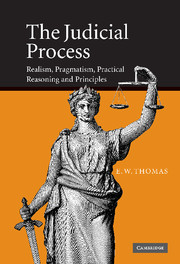Book contents
- Frontmatter
- Contents
- Preface
- 1 Introduction
- 2 Muddling along
- 3 The ‘curse’ of formalism
- 4 Legal fundamentalism
- 5 The idolatry of certainty
- 6 The piety of precedent
- 7 The foibles of precedent – a case study
- 8 There is no impersonal law
- 9 So, what is the law?
- 10 The constraints on the judiciary
- 11 Towards a new judicial methodology
- 12 Of realism and pragmatism
- 13 Of … practical reasoning and principles
- 14 Taking law seriously
- 15 A theory of ameliorative justice
- Subject index
- Authors index
1 - Introduction
Published online by Cambridge University Press: 15 July 2009
- Frontmatter
- Contents
- Preface
- 1 Introduction
- 2 Muddling along
- 3 The ‘curse’ of formalism
- 4 Legal fundamentalism
- 5 The idolatry of certainty
- 6 The piety of precedent
- 7 The foibles of precedent – a case study
- 8 There is no impersonal law
- 9 So, what is the law?
- 10 The constraints on the judiciary
- 11 Towards a new judicial methodology
- 12 Of realism and pragmatism
- 13 Of … practical reasoning and principles
- 14 Taking law seriously
- 15 A theory of ameliorative justice
- Subject index
- Authors index
Summary
Practical skills and legal theory
Judges undoubtedly bring immense practical skills to the practise of their craft. Practical skills are encouraged and developed in the service of clients by the practising lawyer in the law firm or the barrister at the bar, and finally elevated to an art form by those who ascend the bench and are required to make a final determination. That final determination must be reached in disputes where, as often as not, the evidence is conflicting, the issue or issues elusive, and the law to apply uncertain or vague. The judge's practical skills are utilised to resolve and stabilise the facts of the case, to analyse and identify the question in issue, to arrive at a decision on that issue and, then, to justify with reasons the decision that has been reached.
But practical skills alone are not enough. Those skills must be anchored in a conception of the judicial role. Legal theory is fundamental to that conception. Without a clearly thought out conception of the judicial role, a judge is in no better position than a mariner at sea without a compass or, perhaps, a mariner at sea with a defective compass. The practical skills are exercised with either an apparent indifference to any considered purpose for their exercise, or blindly or intuitively as if the purpose were self-evident or innate to those skills and need not be comprehended. Judges risk the charge that they are simply ‘muddling along’.
- Type
- Chapter
- Information
- The Judicial ProcessRealism, Pragmatism, Practical Reasoning and Principles, pp. 1 - 23Publisher: Cambridge University PressPrint publication year: 2005



